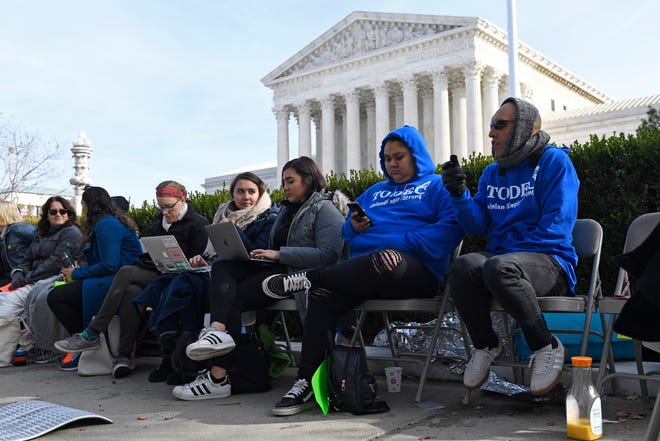Supreme Court to hear case seeking to revive Trump 'public charge' rule nixed by Biden
 John Fritze
John FritzeWASHINGTON – The Supreme Court agreed Friday to consider a lawsuit brought by more than a dozen states challenging how President Joe Biden’s administration ended a controversial Trump-era policy intended to curb legal immigration.
In agreeing to hear the case, the court limited its review to whether a group of conservative states led by Arizona are able to defend the rule.
At issue is President Donald Trump’s "public charge" rule, approved by his administration in 2019, that denied green cards to immigrants if officials determine they may benefit from safety net programs, such as rental assistance or food stamps.
When Biden became president his administration stopped defending the Trump rule in court, not challenging an order from a federal judge in Illinois that blocked the regulation. The Supreme Court dismissed a challenge to the rule in another suit in March.
Public charge:Immigration was a hot topic at the Supreme Court. That's changed.
In the current lawsuit, the conservative states sought to intervene to defend the Trump rule, arguing that the Biden administration bypassed the process required to change regulations.

The main question for the court is whether the states may defend the Trump rule in court at all. The California-based U.S. Court of Appeals for the 9th Circuit ruled they could not.
The Supreme Court declined to take up the broader, underlying question posed by the suit: Namely, may a new presidential administration kill a regulation approved by a predecessor by not fighting an injunction handed down by a court.
A divided Supreme Court in August required Biden to reinstate a Trump policy requiring migrants to wait in Mexico while U.S. officials process their asylum claims. A conservative majority of the court said that the administration failed to demonstrate the decision to end the program was not "arbitrary and capricious."
Three liberal associate justices, Stephen Breyer, Sonia Sotomayor and Elena Kagan, would have allowed the administration to continue its suspension of the program.
The Department of Homeland Security announced in September it would try again to end the Migrant Protection Protocol program in a way that can withstand legal challenges.
